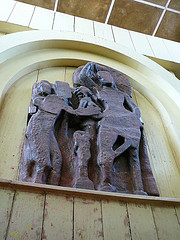After writing a Mother’s Day blog post about Maya Devi, I couldn’t stop thinking about the fact that she dies so shortly after giving birth to the Buddha. Isn’t this sad? We usually think about the Buddha’s early life as being protected from suffering, that he “would not be troubled by cold or heat, dust or grit or dew…” (Rupert Gethin, The Foundations of Buddhism, translated from the Anguttara Nikaya), and yet he suffers a profound loss when he’s just a week old.
 Mark Epstein has been doing some deep thinking on the Buddha’s mother and touched on her death in the recent PBS documentary The Buddha. Earlier this week I was fortunate enough to chat a little with Mark about Maya Devi.
Mark Epstein has been doing some deep thinking on the Buddha’s mother and touched on her death in the recent PBS documentary The Buddha. Earlier this week I was fortunate enough to chat a little with Mark about Maya Devi.
Interview with Mark Epstein
Sam: In our email exchange when you said that you had thought a lot about this, did you mean the Buddha’s mother specifically or generally about the power of narrative?
Mark: The Buddha’s mother. I’ve actually been trying to write about her in my next book, if it ever gets written.
Sam: It seems like the fact that she dies so early in the Buddha’s life is rarely mentioned.
Mark: It’s talked about only a tiny bit, but it has always seemed to me that he must have suffered tremendously. Really, it’s the worst kind of suffering you can imagine in the immediate moment of losing her. A week would have been long enough for him to have grown very attached to her, to have known who she was, as opposed to who his wet nurses were or his aunts or anyone else. He would have already have formed what we called an attachment. So that’s a tremendous loss. A prototypical loss is how I think about it, like in order to become a Buddha he had to have, right away, an experience of loss that runs very deep. Eventually that’s what everyone has to face.
Sam: You’re saying a sense of melancholy can aid a spiritual seeker?
Mark: It’s too much to say a week-old child would have felt melancholy. Cognitively he wouldn’t even know his own mind at that point, but there is a searing kind of loss that runs deep in his experience in his body if not known in his mind. There are many children who are separated from their mother at the age of a week, and they go on to lead productive lives. But there’s a deep sense of what later we would think of as loss.
Sam: If I understand the Buddha’s life story to be powerful because it is archetypal, and make use of it’s symbols accordingly, then is it valuable to think about a more human component to the story? In the case of the mother’s death, would it be fruitful to think about what the character of the Buddha might have felt when his mother died?

Mark: Yes I think so, to the extent that we know anything about the Buddha’s life. He was a real person. And the stories seem to suggest that the mother died. She continues to appear in the stories, in the legends. She’s looking down when he is torturing himself with ascetic practices. When he’s challenged by Mara, “what makes you worthy to be a Buddha?” He touches the earth, and the mother earth rises to affirm his worthiness…
Sam: Are you going to explore all of these types of mother figures in your book?
Mark: Maybe. We will see.
For more thoughts on the death of Maya Devi see Jeff Wilson’s “Birth is Suffering” at Killing the Buddha.